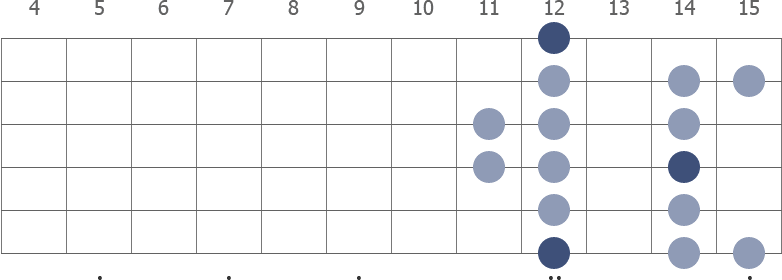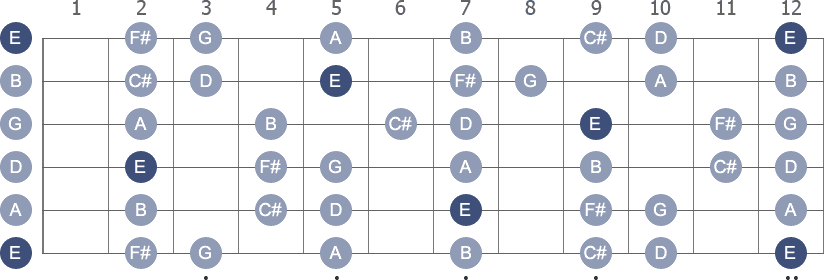E Dorian
E Dorian scale for guitar.
The E Dorian is a seven-note scale, also called E Jazz Minor. Colored circles in the diagram mark the notes, with darker color highlighting the root notes. In the two-octave pattern, the first root note is on the 6th string, 12th fret.
E Dorian 2 octaves

E Dorian full fretboard

E Dorian note names

The scale displayed with its numeric formula, notes, intervals and scale degrees.
| Formula | Notes | Intervals | Degrees |
|---|---|---|---|
| 1 | E | Unison | Tonic |
| 2 | F# | Major second | Supertonic |
| b3 | G | Minor third | Mediant |
| 4 | A | Perfect fourth | Subdominant |
| 5 | B | Perfect fifth | Dominant |
| 6 | C# | Sixth | Submediant |
| b7 | D | Minor seventh | Subtonic |
The E Dorian scale consists of seven notes. These can be described as steps on the guitar fingerboard according to the following formula: whole, half, whole, whole, whole, half and whole from the first note to the same in the next octave.
The E Dorian is the second mode of the D Major Scale. It contains exactly the same notes, but starts on another note. Since Dorian has a Minor scale quality it can also be seen as a mode of the B Minor.
The E Dorian can also be recognized as an E Major Scale with a flattened third and a flattened seventh (G and D instead of G# and D#).
The scale is otherwise most related to the E Natural Minor and E Melodic Minor scales, which differ with just one note in both cases.
This scale is typically played over a minor seventh chord (primarily Em7 in this case) and is used in styles such as jazz and blues. It is sometimes called E Jazz Minor (it shouldn't be confused with the Melodic Minor, which also is reckoned as a minor jazz scale).
One way to learn this scale is to observe the minor 7th chord shapes that it is built around. For example, the Em7 barre chord with the root on the 6th string within the scale in 12th position. Another way is to think of it as the E Minor scale with a raised sixth.
Chords that are related to this scale are the following:
| Em7, Em9, Em11 |
| F#m7 |
| Gmaj7, Gmaj9 |
| A7, A9, A11, A13 |
| Bm7, Bm9, Bm11 |
| C#m7b5 |
| Dmaj7, Dmaj9, Dmaj13 |
The tones in these chords correspond to the tones of the E Dorian scale (triads have been excluded).
Related to this scale are Dorian b2 and Dorian #4, being the 2nd mode of the Melodic Minor and the 4th mode of the Harmonic Minor.
The E Dorian b2 scale, also known as E Phrygian #6 scale, is identical with the E Dorian except for the minor second. It can be displayed as follows:
| Formula | Notes | Intervals | Degrees |
|---|---|---|---|
| 1 | E | Unison | Tonic |
| b2 | F | Minor second | Supertonic |
| b3 | G | Minor third | Mediant |
| 4 | A | Perfect fourth | Subdominant |
| 5 | B | Perfect fifth | Dominant |
| 6 | C# | Sixth | Submediant |
| b7 | D | Minor seventh | Subtonic |
The E Dorian b2 contains the same notes as the D Melodic Minor Scale, but starts on another note.
The E Dorian #4 scale is identical with the E Dorian except for the augmented fourth. It can be displayed as follows:
| Formula | Notes | Intervals | Degrees |
|---|---|---|---|
| 1 | E | Unison | Tonic |
| 2 | F# | Major second | Supertonic |
| b3 | G | Minor third | Mediant |
| #4 | A# | Augmented fourth | Subdominant |
| 5 | B | Perfect fifth | Dominant |
| 6 | C# | Sixth | Submediant |
| b7 | D | Minor seventh | Subtonic |
The E Dorian #4 contains the same notes as the B Harmonic Minor Scale, but starts on another note.
Start the audio and play along with your guitar! Use notes from the scale in the diagram above.
Normal tempo: